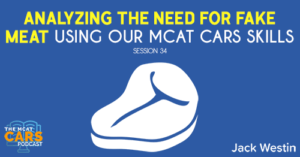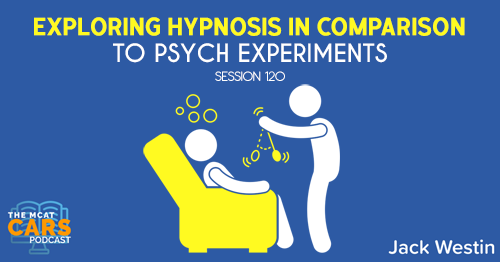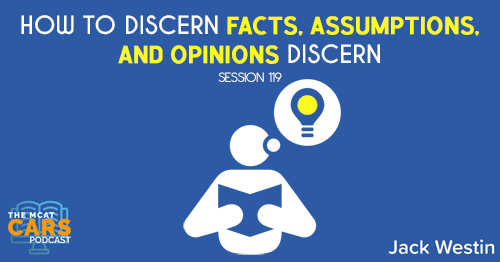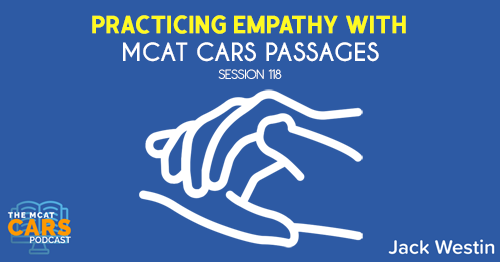Apple Podcasts | Google Podcasts

Session 34
Today, we talk about fake meats and vegan burgers. The article discusses things in a perspective that you may not have been aware of.
We’re joined by Jack Westin. We’re here to help you score higher in every section so you can be confident to get the MCAT score of your dreams.
Link to article:
https://www.wired.com/story/embrace-fake-meat-future-benefits/
Recently, I rolled into a local restaurant to try an Impossible Burger, an all-plant patty invented by the Silicon Valley startup Impossible Foods. It’s renowned for having an eerily chewy, even bloody, meatlike quality, a startling verisimilitude that has made it “perhaps the country’s most famous burger,” as New York magazine recently wrote. One bite into its gorgeous, smoky flavor and, damn, I was convinced.
This is good news, because the time has come to scale up fake meat, fast. Why? Because in the fight to stave off climate change, meat replacement is—forgive me—one of the lowest-hanging fruits.
Meat production chews up land and spews out methane by the kiloton, accounting for about two-thirds of all greenhouse gas emissions from agriculture. A University of Oxford study recently found that, to keep global warming below 2 degrees this century, we need to be eating 75 percent less beef and 90 percent less pork globally. “Without concentrated change, we really risk exceeding key environmental limits,” Marco Springmann, one of the Oxford researchers, warns me.
Diets are culturally enshrined, so changing them will be hard. Fake meat can help camouflage that epic transformation as a mere tweak.
Still, even the most uncanny substitutes for meat face an uphill slog if they’re going to replace 75 to 90 percent of beef and pork. The first taste of an Impossible Burger—a moment when low expectations work a powerful magic in the product’s favor—is one thing. But how do you keep meat-eaters asking for more after their sixth, and their 26th?
[02:08] Paragraph 1, Sentence 1
Recently, I rolled into a local restaurant to try an Impossible Burger, an all-plant patty invented by the Silicon Valley startup Impossible Foods.
Jack says:
The author is painting a picture of going to a restaurant to try a specific plant-based burger.
[02:32] Paragraph 1, Sentence 2
It’s renowned for having an eerily chewy, even bloody, meatlike quality, a startling verisimilitude that has made it “perhaps the country’s most famous burger,” as New York magazine recently wrote.
Jack says:
The author is describing the taste of the burger. It looks really real and it seems real.
[03:10] Paragraph 1, Sentence 3
One bite into its gorgeous, smoky flavor and, damn, I was convinced.
Jack says:
The author likes the burger. It makes you want to eat the burger.
[03:46] Paragraph 2, Sentence 1
This is good news, because the time has come to scale up fake meat, fast.
Jack says:
The author is saying we need more of this.
[04:05] Paragraph 2, Sentence 2
Why? Because in the fight to stave off climate change, meat replacement is—forgive me—one of the lowest-hanging fruits.
Jack says:
The author is using climate change as an argument as to why we need more fake meat. Fake meat as the lowest hanging fruit can confuse students. It doesn’t matter. Knowing the first part about climate change is more important.
Low-hanging fruit means it’s easy to reach. Fruits are nutritious. But reaching a low-hanging fruit is something you can easily do.
[05:24] Paragraph 3, Sentence 1
Meat production chews up land and spews out methane by the kiloton, accounting for about two-thirds of all greenhouse gas emissions from agriculture.
Jack says:
The author is showing us the impact meat production has on agriculture. Take note they’re talking about agriculture here. They might test that on the MCAT. So be careful. You have to be aware of what they’re saying. When you get questions wrong on these little things which they don’t typically test on, you’d be more aware of what you read.
[06:28] Paragraph 3, Sentence 2
A University of Oxford study recently found that, to keep global warming below 2 degrees this century, we need to be eating 75 percent less beef and 90 percent less pork globally.
Jack says:
Here, they’re mentioning a study to back up the author’s view on what we need to do to reduce global warming.
[06:48] Paragraph 3, Sentence 3
“Without concentrated change, we really risk exceeding key environmental limits,” Marco Springmann, one of the Oxford researchers, warns me.
Jack says:
They’re agreeing that we really need to change things.
[07:18] Paragraph 4, Sentence 1
Diets are culturally enshrined, so changing them will be hard.
Jack says:
The MCAT can ask questions about why it’s difficult for people to eat Impossible Burgers. And this has something to do with their culture. By “culturally enshrined,” how is that impactful? How is that important? So don’t overlook this sentence.
[08:15] Paragraph 4, Sentence 2
Fake meat can help camouflage that epic transformation as a mere tweak.
Jack says:
It explains that with fake meat, you don’t have to change your diet that much. It’s like they’re telling you not to eat meat.
[08:50] Paragraph 5, Sentence 1
Still, even the most uncanny substitutes for meat face an uphill slog if they’re going to replace 75 to 90 percent of beef and pork.
Jack says:
The author recognizes this is a hard thing to do.
[09:06] Paragraph 5, Sentence 2
The first taste of an Impossible Burger—a moment when low expectations work a powerful magic in the product’s favor—is one thing.
Jack says:
At first, people’s expectations can be low. And when they take the first bite, they’re surprised it’s not all bad. They’re probably going to be surprised that they like it. The “powerful magic” here refers to the pleasant surprise.
[09:43] Paragraph 5, Sentence 3
But how do you keep meat-eaters asking for more after their sixth, and their 26th?
Jack says:
The question is how do we keep people from eating regular meat and continue eating this vegan meat. It’s a rhetorical question. The author already knows it’s difficult. So what happens when people eat their 26th burger? Are they still going to come back? So it seems like this is a challenge even if it’s still “meat.”
[10:48] The Big Takeaway
The author is saying that we need to help fight climate change and we need to eat less meat. That means more fake meat if you want more “meat” in your diet. This is the main idea, but the author is also saying it’s difficult.
Difficulty is a theme throughout this passage even though it’s not necessarily an argument. It’s the way the author conveyed their opinion. So take note, this is something that’s going to be addressed in the question.
They can ask about the author’s perception of fake meat. It’s easy or difficult to implement. Just knowing that we need fake meat to battle climate change is not going to help you get those questions right.
You’ve got to read the passage. You can’t just read the first and the last paragraphs. Otherwise, you’re not going to get the context. You’re not going to get the vibe the author is trying to portray. And you can only get this by reading it in a way that’s conversational.
'Read to understand. Read to pay attention, to respect the author.'Click To Tweet[12:40] Jack Westin
If you want more practice, go to Jack Westin and sign up for the free CARS Daily Passages where they deliver it right to your inbox.
Links:
Link to article:
https://www.wired.com/story/embrace-fake-meat-future-benefits/
SEARCH SITE
SEARCH SITE
LISTEN FOR FREE











